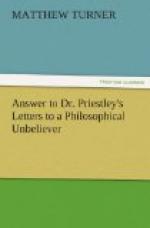If it is said, Nature or the energy of nature is another name for the Deity, then may Dr. Priestley and his answerer shake hands; the one is no more an atheist than the other. And if it is observed that the Energy of Nature having produced men may be capable of re-producing them, so that an atheist is not sure to escape punishment for his crimes, it is easy to say in return, neither is a Deist sure. A good atheist has no more reason to be afraid to be re-produced than a good Deist or a Christian. It may be useful for both of them to be good. If necessary let it again be repeated, that it is not at all meant in this answer to make atheism a plea or protection for immorality. That is a charge long and most unjustly put upon the poor undefended atheist. The knowledge of a God and even the belief of a providence are found but too slight a barrier against human passions, which are apt to fly out as licentiously as they would otherwise have done. All, which this creed can in reality produce, scarce goes beyond some exterior exercises, which are vainly thought to reconcile man to God. It may make men build temples, sacrifice victims, offer up prayers, or perform something of the like nature; but never break a criminal intrigue, restore an ill gotten wealth, or mortify the lust of man. Lust being the source of every crime, it is evident (since it reigns as much among idolaters and anthropomorphites, as among atheists) idolaters and anthropomorphites must be as susceptible of all of crimes as atheists, and neither the one set nor the other could form societies, did not a curb, stronger then that of religion, namely human laws, repress their perverseness. If no other remedy were applied to vice than the remonstrances of divines, a great city such as London, would in a fortnight’s time, fall into the most horrid disorders. Whatever may be the difference of faith, vice predominates alike with the Christian and the Jew, with the Deist and the atheist. So like are they in their actions, that one would think they copied one another. Religion may make men follow ceremonies; little is the inconvenience found in them. A great triumph truly for religion to make men baptise or fast? When did it make men do virtuous actions for virtue’s sake, or practise fewer inventions to get rich, where riches could not be acquired without poverty to others? The true principle most commonly seen in human actions, and which philosophy will cure sooner than religion, is the natural inclination of man for pleasure, or a taste contracted for certain objects by prejudice and habit. These prevail in whatsoever faith a man is educated, or with whatever knowledge he may store his mind.




